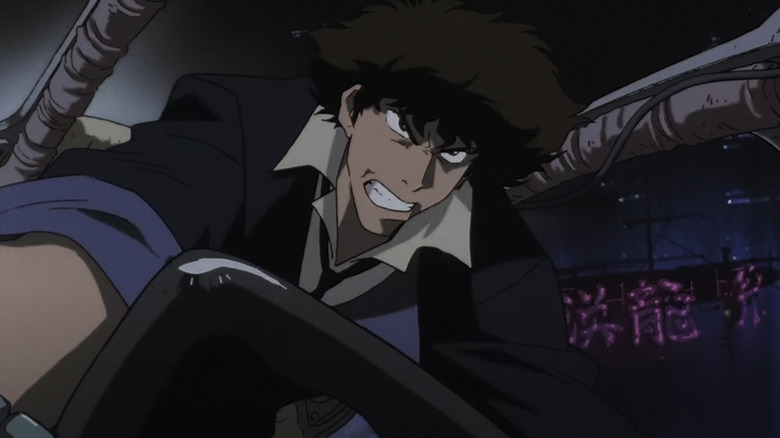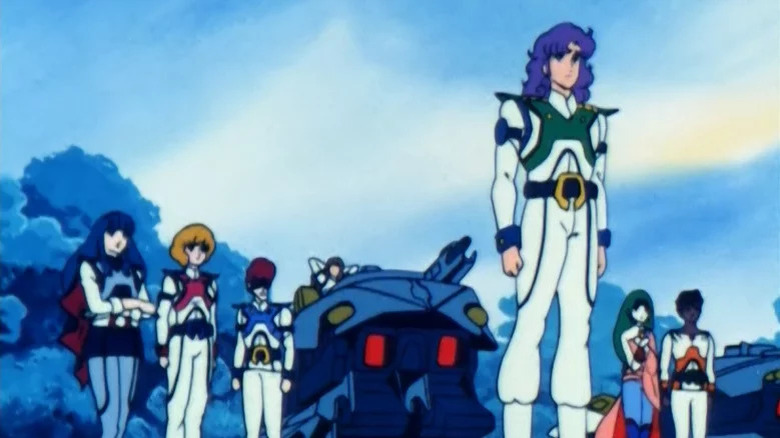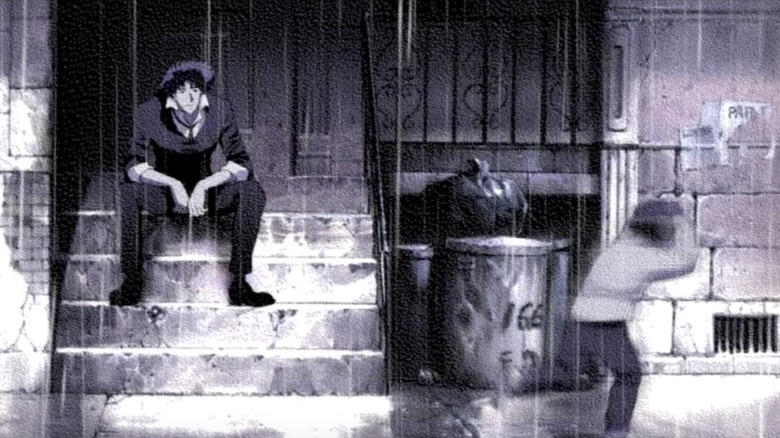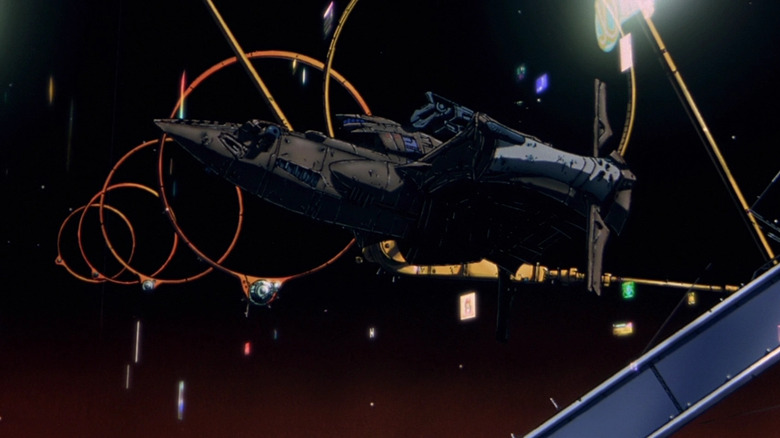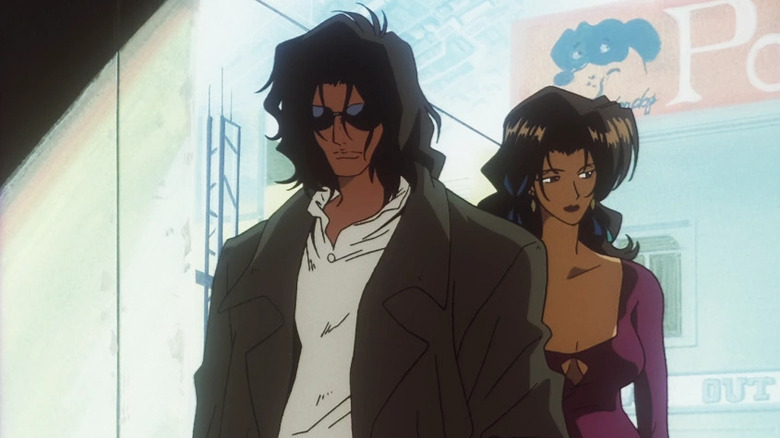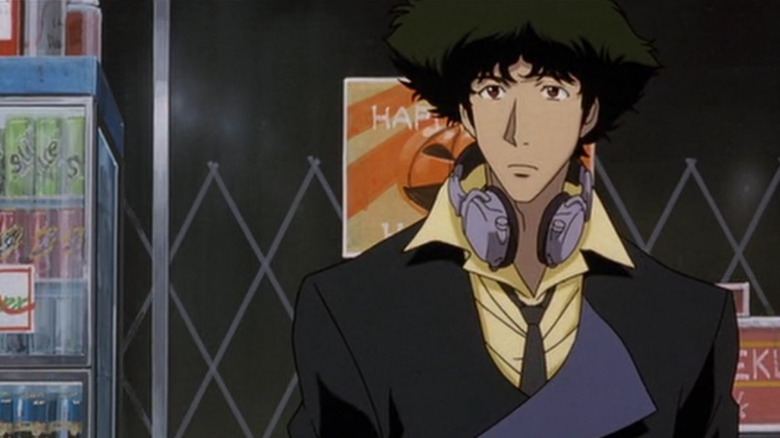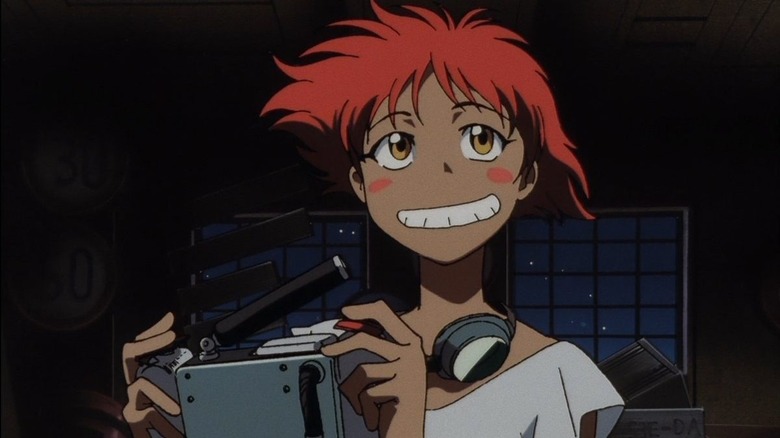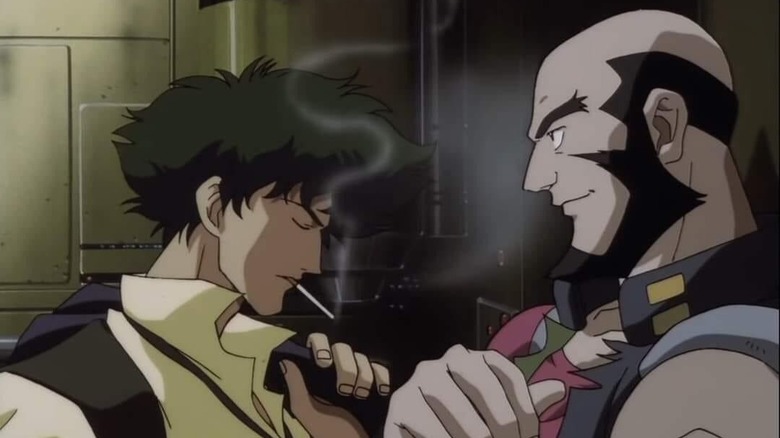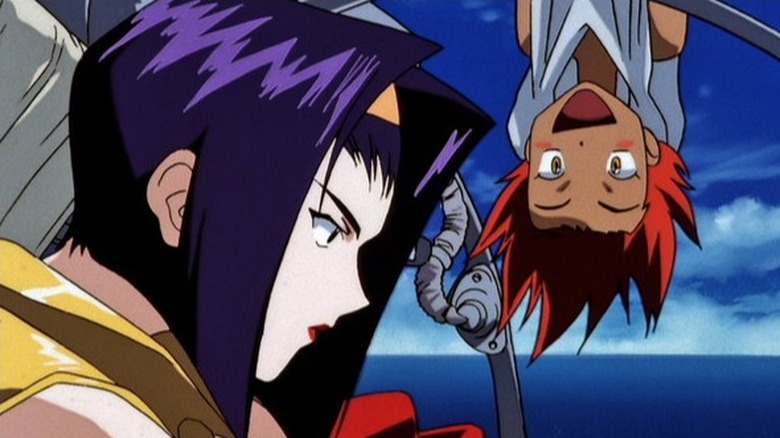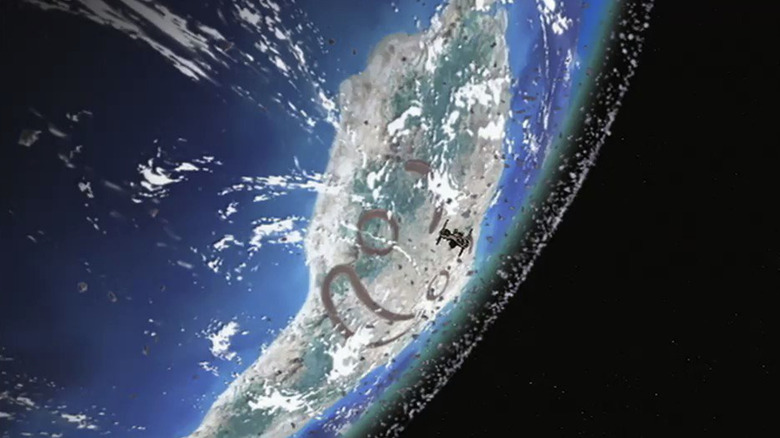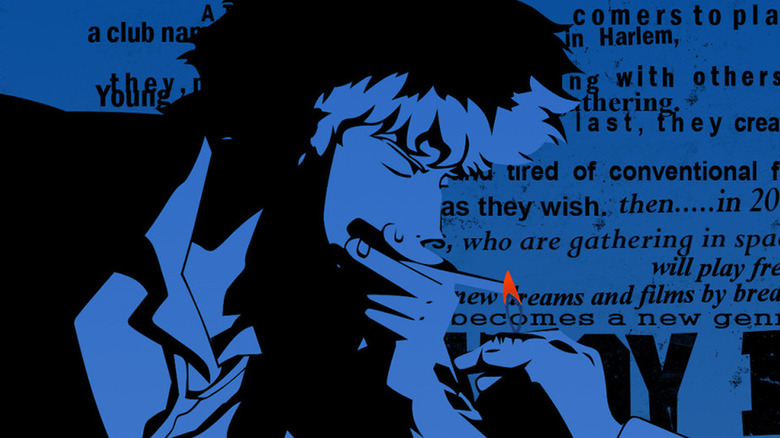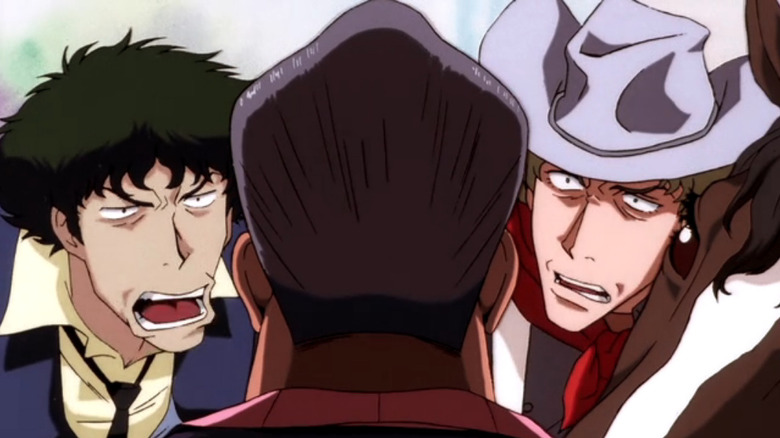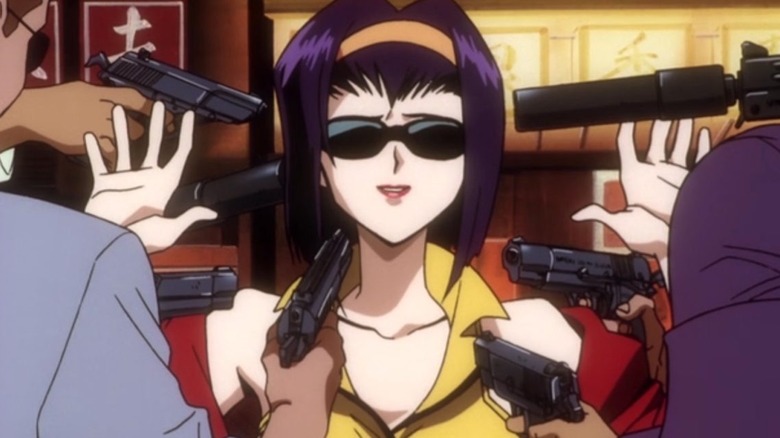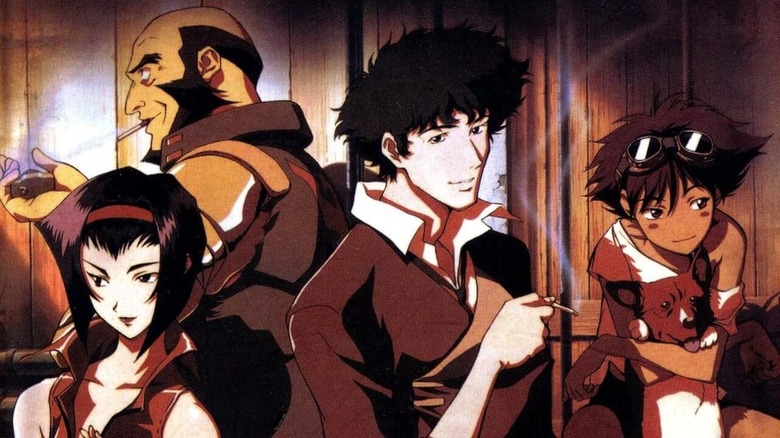An Oral History Of Cowboy Bebop's English Dub – The Best Anime Dub Ever
In the late 1990s, Bandai Entertainment and the Japanese animation studio Sunrise approached young director Shinichirō Watanabe to make a sci-fi action show (mostly so they could sell spaceship toys). Watanabe took that directive and led the creation of "Cowboy Bebop."
This 26-episode show followed down-on-their-luck bounty hunters in the year 2071, when mankind has colonized the solar system and left behind a ruined Earth. It brought Western and noir storytelling together into its sci-fi setting, fused with an existential mood and jazzy music composed by Yoko Kanno.
"Cowboy Bebop" first aired in Japan 25 years ago, from 1998 to 1999, and Bandai Entertainment soon imported it stateside, where it debuted on Cartoon Network block Adult Swim in 2001. If anything, it's become an even bigger (and more enduring) hit in the U.S. than in its homeland. A big reason for this popularity was because the English dub was excellent: The characters speaking the language so fluently complemented the American style/genre-blending of the anime. Even anime fans who always insist on watching anime with subtitled Japanese audio will often concede the "Cowboy Bebop" English dub as quality work.
The dub was produced by the studio Animaze, founded by the late Kevin Seymour, and ZRO Limit Productions, owned by Yutaka Maseba. Directed by Mary Elizabeth McGlynn, who also voiced the mysterious Julia, the core cast included Steve Blum as the cool lead Spike Spiegel, Beau Billingslea as the gruff and wise Jet Black, Wendee Lee as sassy trickster Faye Valentine, and Melissa Fahn as the eccentric female hacker "Radical" Edward.
I spoke with several of the dub cast/crew (and reviewed other interviews by them) and learned how they recorded this terrific dub and managed to replicate the lightning in a bottle of Watanabe's original version.
Session #0: The state of anime in America at the time
"Cowboy Bebop" marked a turning point in anime not just because of its own excellence, but because of how dire things were leading up to it. During the 20th century, anime was not well-regarded in the West; anime dubs, even less so. There was no industry designed around importing anime to American audiences like there is now. American children of the 1980s experienced sliced-up and rewritten shows such as "Voltron" or "Robotech" — Japanese cartoons were just raw materials for American distributors.
There was no prestige for an actor to do dub work, especially due to low pay (which continues to be a problem to this day). Just as an example, "Neon Genesis Evangelion," now regarded as a modern classic, was first released in the U.S. during the late 1990s on VHS, dubbed by ADV Films with a shoestring budget and a cast mostly made up of the studio's audio crew and recruits from local theater.
Marc Handler ("Cowboy Bebop" ADR writer/translator): I think it's hard for people to sort of go back [and] realize how things were back at that time. Anime was very marginal. Nobody took it seriously in any way, shape, or form. It was just the shows with the people with the big, funny eyes.
Jason DeMarco (co-creator of Toonami/executive at Adult Swim): We [at Toonami] had been anime nerds to the degree you could be in the U.S. in the eighties. [We] had grown up with many different anime shows from "Star Blazers" to what was then called "Robotech" to you name it. [...] We were, at the time, going to rental stores in Atlanta that catered to Asian immigrants. Basically, they carried a lot of anime that was not subtitled. It was just for people that spoke Japanese that lived in Atlanta. We would rent it anyway and watch it just to watch it.
Things started to turn around near the millennium's end. VIZ Media was founded as a manga importer in 1986, prolific anime dubbing company Funimation launched in 1994, and the '90s saw TV breakthroughs like "Dragon Ball Z" and "Pokémon." In the 2000s, Adult Swim and its sister programming block Toonami introduced late Millennials/early Zoomers to dozens of new, high-quality anime — like "Cowboy Bebop" — and the tide hasn't turned back since.
Marc Handler: I think "Bebop," along with some other shows, was part of the turning point where people started to realize that there's something more here, and something worth paying attention to. And now we have filmmakers like James Cameron and Guillermo del Toro giving us films with guys in mobile suits and all these anime tropes.
This shift began in Atlanta, Georgia, the home city of Cartoon Network. In the late '90s, Sean Akins had been tasked by Mike Lazzo (the network's head of programming) to create an "action block" in the afternoon. DeMarco, then working at TNT (one floor separated from Cartoon Network), partnered with Akins to conceive of Toonami, which premiered in 1997. A few years later, Lazzo was given a two-hour block by then-general manager Jim Samples, and the result was Adult Swim, launched in 2001 and produced out of Cartoon Network's home, Williams Street.
True to its name, Adult Swim's programming tended to be more mature (Toonami was conceived more as an "after school" block). However, both blocks' programming included imported and dubbed anime. DeMarco, who played a key role in developing both blocks, acknowledged how that happened.
Jason DeMarco: Part of the plan when we developed Toonami was, how do we talk to, at the time kids, in a way that was different from what we saw that existed in the current television landscape at the time? We just felt like most kids' stuff then, and now actually, but more then, talked down to kids in a way. The packaging, the programming, all of it felt like, "Well, it's kids. Let's just make it real clean and simple." And we were like, "What if we approached it from the point of view of being an older sibling and just being like, 'Here's a really cool thing we want to show you that we think is super cool?'" [...] We just said, "Nobody's doing it like the Japanese."
Session #1: The beginnings of the Bebop dub
Before securing a distributor, Bandai Entertainment recruited Animaze and ZRO Limit to dub "Cowboy Bebop." Anime was definitely still a niche at this period, but even a niche has an audience. Studios across the U.S. and Canada were helping to fill the niche with English localizations. "Bebop," though, would be dubbed in Los Angeles.
Yutaka Maseba (interviewed for UCLA student newspaper The Daily Bruin in 1997 by future anime dub actor Stephanie Sheh): In order to expand your audience, which is crucial in the entertainment business especially, you have to create something that a large group of people can understand. That's why dubs are out there.
Kevin Seymour (via the Daily Bruin): You can't really watch a cinematographer's work or the animation when you're constantly reading. These [subtitle fans] are a little bit fanatical about it. I think it's like the difference between Macintosh and IBM, like dog lovers and cat lovers.
In turn, the English dub main cast was selected by Seymour and Maseba rather than auditioning for their parts. They were a motley crew, with varying levels of acting experience between them. Wendee Lee was already a voice acting/directing veteran, while Steve Blum didn't even consider himself a "real actor." Mary Elizabeth McGlynn was an experienced voice actor, but a first-time director. How had their paths led them here?
Steve Blum (via BleedingCool): I was working in the mailroom of a low budget film company, it was called Empire Entertainment, we made movies like "Re-Animator," "Ghoulies," "The Puppet Master" movies later. I got a day job working in their mailroom and the head of the mailroom was casting a quote/unquote Japananimation program and was looking for a guy with a deep voice to do creature work, and I happened to have the deepest voice in the mailroom and he asked me if I would be interested in coming into audition on the weekend.
We go to this crazy studio and they showed me some footage of a creature ripping the arm off another creature and they said, "What would that sound like?" So, I gave it a go and they said, "OK, you're hired." They booked me for twenty-six episodes of a show called "The Guyver" and I just did it because I loved to do it. The people that were running that show picked up other shows and they kept hiring me, kept giving me other parts and I did it for fun. I never expected it to become a career.
Beau Billingslea (who, I should note, was wearing his Jet Black shirt when we spoke): When I first came to Hollywood, I came as an on-camera actor because back in the day, people didn't come here to be voice actors. So I developed a certain reputation here in town and so people knew me, knew my voice. One of the producers around town, he was overseeing dubbing of foreign live-action films into English. So I was doing that. There would be a German film with an African actor, so I would say, "I'm from Nigeria and I did it for my father." So I do a general African accent, and I did quite a few of those. And then one day [in the late '80s] he asked me if I wanted to do anime, and I said, "Yeah, that'd be great. What's anime?"
Wendee Lee: I was immersed in the Hollywood rock scene, and in fact, the person who recruited me to get into ADR, my friend Chris Hampson, was a live sound arena mixer for very high-profile bands. Herbie Hancock, Beach Boys, Devo, Missing Persons, Frank Zappa, a number of pro audio events. And what he would do in between touring is actually engineer at different post-production houses, and he was working at Inner Sound on Sunset Boulevard in the heart of Hollywood, on the Hollywood Strip. He invited me in to come audit a session, and that was my first experience with seeing how ADR — I'd been very used to singing in studio and working with musicians, but [it was] the first time I'd worked with post-production. I think that my musicality transferred easily for me.
Session #2: Shipping out on the Bebop
Mary Elizabeth McGlynn (on the Voice Acting Mastery Field Report podcast): I got a call that Yutaka Maseba, ZRO Limit Productions, had too many shows, not enough directors. And this was after working with them for about three years, and they had a lot of shows, a lot of female directors. And they said, "We have too many shows. We've got this show, we'd like you to take a crack at it. Are you interested?" And I was terrified, and so instantly, I was like "Yes!" because I'm terrified! [...] So I did, and it was a show called 'Cowboy Bebop."
Wendee Lee: At the time, there was a much smaller talent pool, and I sort of was coming into the prime of what I would say were my youthful casting years. And Yutaka [Maseba], the owner of the localization company, and Kevin Seymour, the owner of Animaze, his localization company, had made the decision together on their casting for most of their shows. I think I was about to start directing "Outlaw Star." I had a part on that [which] I petitioned for, Twilight Suzuka, but for "Cowboy Bebop," all I knew is that the producers were experiencing a big boon of growth, so they needed additional directors, and they ended up hiring so many women [...] Often, women do very well in directing roles because we tend to be a bit more sticklers for detail.
Mary Elizabeth McGlynn (interviewed in the documentary "Memo from Bebop: The Dub Sessions Remembered"): I went over to Yutake's house and Kevin was there and we watched the opening, the intro. He showed me "Tank!", he showed me the opening credits of "Bebop," and I said, "Why the hell aren't you directing this? This is gorgeous!" I think he was busy with "Ghost in the Shell" at that point [...] He was too busy, so I lucked out and it was my show to not screw up.
Marc Handler: Someone had recommended me to [Kevin Seymour]. That's why he called me. There were two problems. One was that at that moment, I was planning to leave for a trip to Japan and other Asian countries. Big trip for me, I was breaking away from the U.S. And number two, their rates were too low. I'm not arrogant about that, I appreciate [whenever] someone offers me work. But still, you set your rates, and theirs were too low [...] So he really should have just hung up the phone at that point. "Thanks, maybe next time." But he didn't, for some reason."
He needed a writer who he didn't have to babysit [...] They could walk into the recording studio and record it and not worry about it. He didn't want to have to reread it, fix it, revise it, send it back to me. He didn't have time to go through any of that. So that was his deal. So I said, "Well, how about this? What if I write the first episode at your rate, at the lower rate, and then if you don't like it, okay, we part ways, and if it does what you need, then you pay my rate for the rest of the series?" And he was okay with that.
Beau Billingslea: I started developing a reputation in the voice world. The voice world was very small back then, and so I was asked to [play Jet on "Cowboy Bebop"].
Wendee Lee: All I was told is kind of all the information at once, that I would be directing "Outlaw Star," and that I would also be voicing one of the primary characters on "Cowboy Bebop." And so that's how I jumped into it. It was such a surprise. It was such an honor, too.
Skip Stellrecht (voice of the main villain Vicious, interviewed for "The Dub Sessions Remembered"): I had met Mary Elizabeth on something else, I don't even remember what we were doing, and they were trying to find the role for Vicious, the right voice for it, and I think they were having a little trouble, and she said, "Man, I think you're right for this." She called me up said, "You have to come in an audition for this." [...] Next thing I know, [I'm] doing Vicious and loving it.
Mary Elizabeth McGlynn (during a Reddit AMA): I had nothing to do with [the casting]. Except for the role of Julia. I was so in love with Steve's voice as Spike I asked them if I could play her, should she ever show up.
Melissa Fahn (during a cast reunion interview): The first day of recording, [McGlynn] brought me into a big sound studio and there was a big screen and she said, "Let me just play you the first credits." And I heard the [theme song] and my jaw just dropped and she said, "This is what we're working on," so I said, "OK!"
Fahn wasn't alone in being blown away by "Tank!" Rather than letting "Bebop" languish on DVD and VHS for only hardcore fans or curious kids to ever watch, Bandai recruited Cartoon Network to air it on TV. DeMarco tells me that the series' opening instantly piqued their interest.
Jason DeMarco: We had a very good relationship with Ken Iyadomi, who was a producer for Bandai Visual and now Sunrise [...] He brought us a bunch of shows, but one of the ones he brought us, he said, "I think you should check this show out," because he produced it. He was like, II think it's really good." Actually, the first thing he showed us was literally just the opening. Obviously, that's iconic, but the second we saw it we were like, "We need to see more of that right now."
The dub was in the process of being made at the time, at that exact time. So, he showed us actually a dubbed episode or two and Steve Blum's voice as Spike and Beau Billingslea as Jet, we were just like, "This is so good." And that was actually one of the reasons we ended up getting Steve to voice Tom [the animated host of Toonami]. So, it all dovetailed all at the same time in a weird way. It was like a nexus of Adult Swim and Toonami and Steve Blum, all these things at once.
Steve Blum (at Momocon 2016): Toonami has been such a huge part of my life. When it went off the air I cried, and when it came back, I celebrated with everybody else [...] [Toonami has] brought anime, now, to probably a third generation.
Session #3: Making sure not to mess it up
The cast and crew of the "Cowboy Bebop" dub loves the show, too. Read or watch any interview with them and you'll see they each have an excellent grasp on all the characters, not just their own. All the recurring praises of the show — how it feels made for a Western audience, how terrific Yoko Kanno's score is, how it's the perfect "gateway" anime — are ones the cast themselves echo. Even if they didn't expect the show would catch on the way it did at first, most of those involved have a love-at-first-sight story with experiencing the show.
Marc Handler: The point at which it really hit me, I'm just watching [the first episode, "Asteroid Blues"], no expectation. And you get to this scene, which is about six minutes in, I think, five or six minutes in, and it's the bar room fight. So I'm expecting a regular anime show, and all of a sudden you've got this drug dealer spraying a drug called Red Eye into his eye, and he turns into this enhanced, drug-crazed maniac. And then the whole fight is shown from his point of view while he's high on these drugs; we're seeing it through a red haze, we're seeing these blur effects, we're seeing these bizarre angles, we're seeing this fight in this kind of stop and start, drugged-out perception of it. And it was certainly nothing I expected to see, and it was mind-blowing, breathtaking. So from that moment, I knew this was not an ordinary series.
This only added to the pressure, since they knew they were working with something special and had a responsibility to represent it to the best of their abilities. For Steve Blum, that pressure was especially felt since he hadn't been trained as an actor and had never led a series before. Playing Spike became the education and confidence boost he needed to make voiceover into a career.
Steve Blum (at Momocon 2016): I didn't know [making voices] was acting, honestly, for many years. I had been doing this since I was a little kid, doing voices and creating little scenarios, and I didn't understand that what I was doing was technically acting. And Mary Elizabeth McGlynn is the one who told me I was an actor after we had completed "Cowboy Bebop" and I started getting some feedback from the fans. I was very insecure about the whole thing, I said, "I just don't feel like I'm qualified to do this, other people have studied acting," and she said, "What do you think you've been doing all these years?" And that's when it sort of clicked for me: "Oh! I'm an actor."
Session #4: Recording the show
Even though the show was completed, the dub cast experienced it with the same surprise as an audience watching it for the first time.
Steve Blum (in a blog post for the show's 20th anniversary): We never received the scripts in advance and hadn't seen the Japanese version prior to recording. Everything was a cold read.
Marc Handler: I was still leaving the country soon. So we kicked that around, and I said, "Well, maybe I could write the episodes while I'm traveling?" And this was an absolutely new idea. It's not a big deal today, but at that time [...] The internet was new, so I would have to send in the scripts via internet cafe from other countries, which might or might not work.
I was going to have to travel with videotapes, a VCR machine, had to be a special machine with single frame control, front and back, and a monitor. Small monitor, but you had to have one of those, right? Plus the adapters for different electrical connections, different voltages. And [Seymour] had tight deadlines. So again, any other producer would've just said, "Nah, nah, this is too much trouble, it's too iffy." But he hung in there, and eventually we said, "Okay, well, let's give it a try."
So I ended up writing the series while I was traveling in Japan, Thailand, Philippines, Bali, Lombok, Cambodia, Borneo, all these crazy places. So I traveled with a big, hard case luggage full of VCR and all of this stuff [...] And I was doing my best work, because I was really happy. Couldn't be a better life.
Anime dubbing is a team effort, from the actors to the directors to the audio engineers. For the actors, however, recording is a solo performance. The process involves sitting in the booth, watching the original version, and reading their lines to match the animated lip flaps with the translated dialogue. There's no sitting in the recording booth together, as can be the case for original language recording.
Beau Billingslea: [With voice acting], you have to basically stay in place. You have to be what we call being on mic, so you have to have the mic in front of you. So if you have physical activity, you have to try to do some movement, but you also have to stay on mic. So you're restricted that way and when we're doing anime, it's already been drawn, so we have to fit within the flaps of the character. So there's a certain amount of restriction that we experience when we're doing the voice stuff that we don't have when we're doing on camera. On camera, I have my body and my voice and your characters, they walk differently, they talk differently, they have different physicalizations, and so maybe [it's] a little bit easier to make it your own.
Wendee Lee: Sync is not an easy art form. It's so crazy. It's so right brain and left brain, and it's really combining a technical discipline with artistry and fusing them together so that seamlessly, the viewer, the audience, has an uninterrupted experience of immersion. That's what we're trying to achieve.
Kirk Thornton (voice of "Asteroid Blues" villain Asimov Solensan): I've always been a bit of a technical actor, and there's a lot of technique involved in dubbing anime, or dubbing anything. It's a very difficult art to make it sound real and yet fit it within these really narrow constraints of the lip flaps. In fact, a lot of anime acting and dubs, I think a lot of it's kind of poor, actually, because it is so hard. It's easy to fall into something and just technically hit those lip flaps and not worry as much about your performance as it is sync.
How did any friendships form when the actors were essentially working alone?
Beau Billingslea: We'd cross going in and out of the studio, obviously, and a lot of times you're hanging around, you're waiting, and so you're chatting in the waiting room. And back in the day, we were using paper, right? You remember paper? We weren't using pads or anything. So anyway, we started writing notes to each other by our loops and the script. So I remember one day I went to work and Steve had already worked, and by one of my loops he said he wrote, "Hey, Beau, Jet sucks." So I said, "Oh. Oh, okay. It's like that, is it?" So then I went forward in the script and I found one of his loops and I said, "Hey, Steve, Spike sucks, and the Bebop is my ship!" So yeah, we started a nice camaraderie that way and we'd have lunch together, and so it took a little time. I can't put a time limit on it, but it took a little time.
Session #4 Part 2: Directing the cast
The one unifying presence in their recording experiences was McGlynn. How did she handle her first ADR directing experience?
Wendee Lee: I think I did share a few [directing] tips with Mary when we first started. I just asked her originally if she knew how to direct sync, and it was new to her, but she had been doing a lot of voicing herself, and she's an accomplished singer and musician. So my advice was that she'll take to it very quickly.
Steve Blum (in the aforementioned blog post): Mary Elizabeth was our lifeline, providing context and helped us to define and flesh out our characters in real time. I truly believe I learned how to act in the process of recording this show. Occasionally Mary would let us hear some of the music while recording, and that gift influenced all of our performances.
Kirk Thornton: I've worked with Mary for years, on both sides of the mic, because I've worked with her as an actor, her directing, [and] I've directed with her acting. The great thing about Mary is she always knows so much about whatever project she's working on and gives you tons of background information, almost to a fault, almost too much information that you're just like, "Okay, I get it. I get it, let's just get to work." But no, she's an incredible director and always fun to work with, and she keeps the process enjoyable and creative. And the job of a good director is to keep you relaxed and yet energetic so you're at your best, because you're at your best when the adrenaline's pumping, and yet you're relaxed within that adrenaline.
Melissa Fahn (at Animefest 2023): Mary is an actor's director. She got inside all of us and she just knew us.
Beau Billingslea: If you're an actor or had been an actor, you understand the actor's sensibilities, and maybe it might be slightly easier for you to express what you need from the actor as opposed to someone who doesn't have the acting background.
Steve Blum (interviewed with McGlynn at Granite City Comic Con 2017): When Spike was smoking, I had stopped smoking many years before, and to get an authenticity to those scenes, [Mary] would hand me a cigarette and actually put it in my mouth, and so when you see him going [mimes smoking] on the cigarette, I'm blowing it out.
Mary Elizabeth McGlynn (in "The Dub Sessions Remembered"): It's different because he would be doing it with a pencil, and I was like, "It's not the same sound, it's not the same weight, and it changes — I'm kind of a method actor — it changes the performance a little bit." It definitely changes the sound. When you talk with a cigarette in your mouth, it sounds different, it has a lighter weight than if you talk with a pencil in your mouth.
Steve Blum: I was so honored she would give up one of her precious cigarettes.
The last ingredient is chemistry. Watch the "Cowboy Bebop" dub, and listen to Spike's banter with Jet and Faye, or the way he and Vicious exchange charged lines in the climax of episode 5, "Ballad of Fallen Angels." The way these characters play off of and react to each other feels so organic that it's nearly impossible to believe the actors weren't in the same room when they said these lines. And yet, it's the truth.
Mary Elizabeth McGlynn (during her Reddit AMA): It was my job to make sure everyone sounded like they were recording together. I always had it in my head where I wanted to take the performances and once each actor came in we discovered the nuance together. I made sure they got to hear each other's performances when they recorded. Of course, the first one in never got to hear the others.
Wendee Lee: It's a luxury to have another voice already done when you go in as the actor, say, actor B comes in to now do your part [...] I often would be the solo voice, the only voice when I had scenes with Spike, or it would be the opposite. His whole performance would be done and then I'd be able to play off of him. Same with all the other cast members. I do have memories of both, of being solo and also having lots of other audio to play off of. It's always so much richer when you've got other voices to play off of.
Session #5: Crafting the characters
A dub performer, by nature, is offering their own spin on something that already exists. How much personality can an actor offer within such narrow confines? Quite a bit if you have the resources and ability, as the "Bebop" cast proves. McGlynn initially turned down the audio when first screening the series to many members of her cast. This meant it was the animation that shaped their perception of the characters, and thus their dubbed performances, more than what the original actors sounded like.
Steve Blum (in the aforementioned blog post): Spike was the very antithesis of how I saw myself at the time. He was cool, elusive, confident, and he didn't give a damn about anybody (at least on the outside). I had to learn really quickly how to really act. You have to remember, this was 20 years ago. Back then I was a guy mostly known for creature voices, monsters, screaming, etc. I'd never been expected to invest myself that deeply into a character before. I learned some powerful (life and voiceover) lessons in the process that changed me on a cellular level and altered the course of my life. Spike had to sound authentic, and to get there, I had to find some of his qualities in myself. Some were not easy to admit I possessed. Others, I had to step into his shoes and experience fully. Sometimes it was wildly uncomfortable.
Mary Elizabeth McGlynn (in "The Dub Sessions Remembered"): Steve always said, "Oh, I'm not an actor," and after about three episodes, I just said, "If you say that one more time, I'm going to kick you in the balls, because you have one of the most amazing instruments I've ever heard and your instincts for this character are spot-on. So I don't know who's telling you, 'You can't do this, you're not an actor,' but put them away and just do what is natural to you." [...] We sort of learned it together because I hadn't directed that much, so I had to find a way to make him feel comfortable and confident. As the series went on, he got into some really vulnerable places.
Beau Billingslea (in "The Dub Sessions Remembered"): When [Steve] is in the booth, cause I've seen him doing the fights, he's doing the fights! He's kicking and he's punching and he's twirling, and he's able to stay on mic. Which, it's almost like, his head is there and his body is moving under him, like, how does he do that? [...] It would be fun to have him on camera, for a full session, when he's voicing Spike, because he's so animated.
Steve Blum (in "The Dub Sessions Remembered"): I love Bruce Lee. As a kid, I remember trying to imitate that fighting style, very unsuccessfully, and it was so cool to see that actually fleshed out [...] to hear [Spike] talking about going with the flow and moving like water, that philosophy kind of became, not so much with the fighting [but] going with the flow, sort of became a life philosophy for me later on. I didn't realize that would happen.
Beau Billingslea (in "The Dub Sessions Remembered"): The first session with Mary Elizabeth, we were trying to figure out how did [Jet] sound? We were playing with a Southern accent [...] maybe a little Western accent. Then she said, "You know, let's use your voice." I said, "Well, that's boring." She said, "No, no, no, let's do that," exerted her influence, and luckily for me and all of us, she prevailed. [...] It's a lot easier to just emote and be a character and experience a character's life when you're not concerned about trying to do something that's not really you, and as it turned out, Jet's a lot of me.
Beau Billingslea: It was nice to have an episode ["Ganymede Elegy," episode 10] where we went to [Jet's] backstory, because as actors, what we do is if we're not given a backstory of the character, his history, his life, then we create one, the foundation of the character. But when he goes back to Ganymede, he sees his old girlfriend, and then he puts everything to rest by tossing the watch into the water, that was some pretty real stuff. You don't necessarily think of that as a cartoon. It was real people stuff, real human stuff.
Session #5, Part 2: Diving deeper
Wendee Lee: I think I brought kind of the American girl rock and roll influence [...] sex, drugs, and rock and roll is what Faye was living in, minus the drugs because it's such a taboo for Japan. But when you think of that aspect of it, "Mushroom Samba" [episode 17 of "Cowboy Bebop"], them getting high on mushrooms, et cetera, they're really talking about consciousness expansion. So I was interested in exploring consciousness expansion and altering their consciousness when those things came up and going for sex, drugs, rock and roll, and space. Space exploration, and the hustle of making it as a kind of outlaw on the edge of the law as a bounty hunter.
Faye has a very tarnished past, so she's always running from something and chasing something at the same time. And I used that energy and identified it quickly with the character. It was the easiest fit of a character for me that I maybe have ever played. She was closest to my natural voice. And also I was very involved with the behind-the-scenes VIP world of rock and roll, and I had a lot of backstage passes to great experiences. I felt like the girls that I was encountering in that scene were very much like Faye. So I knew who she was. I knew those girls, and I knew how those ladies would use their sex appeal and their kind of seductive capabilities to get what they want, to be manipulative. And I could just see that in Faye from her very first scene. So it was a very easy fit to slip into her go-go boots.
Mary Elizabeth McGlynn (in "The Dub Sessions Remembered"): When I saw the character of Faye, the Japanese version of it, we went a different way that played to Wendee's strengths. She does have that caring, mothering nature, so we actually had to play against that a lot to establish Faye. And once she locked into it, she just latched onto that conniving, feminine, but for my take, Wendee brings a more mature sense of the feminine than I think what was established in the Japanese version.
Melissa Fahn (interviewed for the 20th anniversary of "Cowboy Bebop: The Movie"): Just watching Edward's movements, she had this kind of old-school rubber hose thing, animation style about her as well, that she was very effervescent. And just, to be playful, and to be honest, and to be young, but also be a genius, there was just so much that came into play that was so fun.
Mary Elizabeth McGlynn (in "The Dub Sessions Remembered"): Melissa Fahn is a brilliant, brilliant singer, so we played a lot with music and gave Ed a real dynamic range vocally. She just couldn't be crazy or silly enough.
Skip Stellrecht (in "The Dub Sessions Remembered"): It was a constant battle to keep [Vicious' voice] way down, and I can go low, but for him, they didn't want the real gravel but this smoothness to his voice. And I remember, constantly, we'd have — "Mary, can we do that again? I don't think I was quite low enough" or she'd go, "I need you to stay down on that, stay low, stay low." [In Vicious' voice] "All right." That's what made him smooth, and you just didn't know where he was at.
Mary Elizabeth McGlynn (in "The Dub Sessions Remembered"): [Skip] lives in these big huge characters, so for [him] to take a 180 degree turn completely and get down in there with texture and play against Steve, who's got all this unbelievable texture and everything else, to find so that the weight of the character played against the weight of Spike, [it] took a while. It really did, for both us, we had to find the character together.
The one character they didn't reimagine? Ein the "data dog," the Bebop crew's pet and a super-intelligent Corgi. For Ein, the dub reused Kōichi Yamadera's barks and yips from the original Japanese.
Session #6: All the time in the world
Anime dubbing has come a long way in the 20+ years since "Cowboy Bebop" was translated into English, as DeMarco attests.
Jason DeMarco: Dubbing back then was a whole different ball of wax. They weren't necessarily trying to be — this dub [for "Cowboy Bebop"] was, but most dubs weren't really concerned with being 100% [loyal] to the Japanese material as much as they were like, "What fits the lip flaps and the general vibe of the scene? That's great." Because the dub actors weren't paid anything. They're still not really paid very well now, but they were paid even less then. There's no union. So, it was like just people grinding it out and you almost never got a really quality dub because of these various issues.
Unlike the previous voice acting generation (to which the "Cowboy Bebop" cast belongs) who usually came to anime dubbing by chance, many actors who joined the business in the 2000s and 2010s sought it out because they're anime fans. For instance, Cristina Vee ("Hunter x Hunter") was inspired to do voiceover by watching "Sailor Moon" as a child, while Aleks Le ("Demon Slayer," "Vinland Saga") credits cartoons with helping him to learn English after moving to the U.S.A. as a child.
While dubbing is more often a labor of love than the dregs it was in decades past, resources can still be scarce. In particular, a new phenomenon in anime is "simulcasting." Thanks to streaming, anime fans can legally watch new episodes on services like Crunchyroll once they've aired in Japan, rather than waiting months or years for imports. However, this also means there can be even greater pressure to get English dubs out quickly.
The "Cowboy Bebop" dub was a rare instance where the cast and crew had the right mix of time, autonomy, and affection for the material to do it right.
Wendee Lee: With "Bebop," we were given additional time to go back and review scenes. To get something recorded, take a break, and then come back and watch the whole thing and let it wash over you and see, "Oh wait, let's go back and pick up this line and that line and just kind of tweak it a little more and then review it again." I wish more production companies understood that when you give it that little extra time, it doesn't have to be a ton of time, but you relax the recording schedule just a little, it can have an astounding effect on the overall outcome of quality.
Beau Billingslea: Back when we did "Bebop," they gave us a lot of time. We weren't pressured with the time to hurry up and get it done. So consequently, we could go for the gold. We could really try to get the dub as perfect as possible because we had the time to do it. I remember we were in a session and Mary Elizabeth was directing, and I did a loop, and then I thought, "Wow, I really liked that take." I said, "Really good." She said, "No, Beau, we're going to have to do it again." I said, "What?" She said, "Look, let's watch it." And we looked and it was ever so ... You couldn't even really see it, right? She said, "It's not perfect. It's not perfect so we have to do it again." I said, "Okay, we'll do it again."
Steve Blum (at BoroughCon 2017): On some of the shows, they would sort of leave us alone. On "Bebop," it was Mary and I and an engineer basically, most of the time ... on "Samurai Champloo" [Watanabe's follow-up show, where Blum dubbed lead character Mugen], we had a bunch of the Japanese clients in the room with us and they were analyzing every single line that we did and they wanted to make sure it was exactly like the original Japanese and they would give me really strange direction.
Melissa Fahn (at Animefest 2023): On most animes, it's all done by time. You have to get in and out, you've got to get it done quick, and Mary said, "Oh, we have the luxury of time, they didn't care, we could take as long as we wanted on these scripts."
Jason DeMarco: Once we [at Cartoon Network] heard the quality of the dub, we couldn't really give them much direction because we didn't know where it would air yet, so it felt pointless to try to dig in and make them change lines.
Session #7: A musical soul
Several of the "Bebop" dub cast have musical backgrounds, which helps explain their affinity for the series since music is part of the series' soul. They all agree that the opening, "Tank!", blew them away. Wendee Lee describes the score as "an additional cast member," because there are plenty of scenes across all episodes where the show is willing to keep its characters quiet and let the music carry the mood. This score is the work of composer Yoko Kanno and her band, Seatbelts; Kanno even ventured to New Orleans to make sure the music had the right funky spirit.
Yoko Kanno (interviewed by Red Bull Music Academy in 2014): The seeds for [the "Cowboy Bebop"] score were sown in middle school and high school when I was a member of the brass band. I'm not sure how it is nowadays, but back then all the songs kids were taught weren't at all cool, so I made and performed originals. But a part of me was always frustrated because I couldn't understand why everybody else was content playing the uncool music. I wanted to play brass music that shook your soul, made your blood boil, and made you lose it. This yearning became "Tank!" which was the opening theme. I wanted to make music which would light a fire in me when I played it.
Wendee Lee: Yoko Kanno, talk about eclectic. Jazz, atmospheric, ambient music, sometimes bluegrass, country. I mean, you name it. It was so encompassing. And really what became my passion early in life was world music. So being able to hear something that sounded Asian, something that sounded European, sometimes it would be a song in a different language. It was just magical. We all fell in love with the score and all are huge fans of Yoko Kanno. So I think that made it a standout. I have often said, I feel like the music and Yoko's work was sort of an additional cast member and so critical to the storytelling, the art form.
Beau Billingslea: I love the music. The music is just absolutely awesome. It's eclectic, so you can hear classical music, country music, jazz, blues, funk, all of it. So when I started session after session, we'd hear some of the music. When I heard "Tank!," I said, "Wow, this is awesome stuff." And when I heard a lot of that music, I was thinking it was a brother down in New Orleans who was creating this music, and I find out it's Yoko Kanno. I said, "Oh, this little Japanese woman created this blues and this jazz." And she is a brilliant artist. But the music obviously just brings the show alive. It's just — what do the young people say? Awesome sauce.
Wendee Lee, with her background in both music and ADR, often analogizes her anime work to music, including when she spoke with me.
Wendee Lee: [Dubbing is] almost like learning to play an instrument. We lay out a script very much like we would on par with how you would lay out music. So it's not a staff, but it's a sentence. And if it's underlined, that means that it's [a] mouth not seen or off camera, or it's a voiceover or the character's thoughts. And if there's a hitch, it indicates a pause like you would see a rest in music, in a stanza of music. And if it's a short pause, it's almost like a quarter rest. If it's a really small pause, it would be an eighth. But yeah, we try to map it out in a fashion that's musical. So we recruit heavily from theater and dance and singers and musicians because of that ability. But all of that skill has to be in tandem with solid acting.
Session #8: Comparing to the Japanese
When you're translating between two languages as widely different as Japanese and English, matching accuracy with quality is a challenge. The fundamental question of "how word-for-word should the translation be?" hangs over production for both writers and actors.
Marc Handler: My answer is the middle way. The middle way is a fundamental concept of Confucianism and other Asian thinking as well. And that's the way I work. That's the way we work as a group. We don't just change things because, "Hey, I got a great idea." That's an extreme. Okay? On the other hand, we did not obsess over word-for-word accuracy. That's just as certain to wreck a work as the other extreme. And I have worked with companies that insist on that. They've got a translation, and everything's got to be word-for-word. That's lethal. It's destructive. When you hear anime, and sometimes you hear it in the next room and you go, "What's so weird about that dialogue on the TV?" And you look over and you go, "Oh, it's anime." That's when you get that unnatural, wooden kind of sounding dialogue. You're trying to follow it word-for-word. That does not work either. You have to bring the show to life. You can't turn it into a museum piece, even in the name of, "We respect the creators so much, we don't want to change a word of their work." You're destroying it.
Beau Billingslea: When listening to the original Japanese production, I use that not for my performance so much, but to feel the mood of the scene and what level of energy is required in that scene [...] How projected is it? Is it more intimate?
Melissa Fahn (interviewed for the 20th anniversary of "Cowboy Bebop: The Movie"): You don't want to do something drastically different, but we kind of had free reign to create these characters [on "Cowboy Bebop."]
Beau Billingslea: As an artist, you definitely don't want to be mimicking somebody. That's not enjoyable and it doesn't reflect artistic integrity if you're just going to mimic somebody else's voice.
Kirk Thornton: A lot of it you're pulling from the Japanese, because a lot of times they want you to stay relatively close to the Japanese, and so you take that as a guidepost. And then I always try to Americanize performances as opposed to just doing exactly what the Japanese did, because a lot of times the Japanese, their efforts and reactions tend to be different than we would do. And so I'll try to Americanize it.
Jason DeMarco: Japanese actors and Japanese speakers speak in a different way with the same emotions that they're conveying as an American or English actor. We speak differently because our cultures are profoundly different. In Japanese, you are telegraphing certain emotions in a very different way with a very different set of parameters. And it might be the same emotion you're trying to telegraph in the U.S., but if you did it the way they did it in Japanese, it just wouldn't make sense. So, I think what [the "Cowboy Bebop" dubbing team] did was [they] correctly said, "Look, the intent of the scene, we're not going to change and the characterization we're going to hold onto, but we're going to do it in a way that makes sense to us as English speakers. Because what we are doing ultimately is being produced for an English-speaking audience and needs to make sense to them."
As much as the "Bebop" dub cast revered the original, their interpretations of their characters and how they played them didn't always align with the Japanese cast.
Beau Billingslea (during the "Dinner Aboard the Bebop" cast reunion): One of the distinctions that was made between the original Japanese and our edit, [was] that [Steve Blum's Spike was] sexy, and the Japanese Spike [Kōichi Yamadera] was not.
Steve Blum (at the same reunion): How could Spike not be sexy?
Wendee Lee: It was so surprising to me, the original actress [Megumi Hayashibara], when they asked her what her take of Faye was, her first impression, she said she was very vulgar. And it's so funny because I never saw Faye that way. I saw her as an extrovert, as super confident, as body positive, beyond the confidence I had ever experienced personally. So exploring that confidence through her perspective was liberating. I mean, it was very good for me to be going through that as a woman in my twenties and thirties.
Jason DeMarco: I can tell you that the Japanese dub is what Watanabe wanted, period. Now, that doesn't mean that those characterizations need to be set in stone and it doesn't mean that the English actor's interpretations of those characters are wrong. They're just different.
I get annoyed when people are very anti-dub. People are like, "You're changing all the meanings." And I'm like, "Look man, unless you speak Japanese and you are a native Japanese speaker, you are still getting a translation and someone is making those decisions for you so that you are receiving their interpretation of something." That's just the nature of language. It's not anybody's fault that somebody interpreted something and another person said, "Well, it should have been interpreted a different way."
What does Watanabe himself think of the English dub? There's a longstanding rumor that he prefers the English dub to the Japanese original. It seems like that is just a myth, but he maintains a working relationship with Adult Swim; his next anime, "Lazarus," is being produced with them. DeMarco was able to share insights on Watanabe's feelings.
Jason DeMarco: There are some things about the English dub I think [Watanabe] really, really likes, and then there are other things he doesn't like that they didn't do what he asked for, but I honestly feel like they did the right thing. He doesn't speak English, so sometimes he is like, "More emotion!" in a part where everyone's like, "No, you don't really want more emotion there." But I think he understands that "Bebop" became popular in the West in part because of this great dub that allowed people to access it who might not have seen the subtitled version first. And I think he's profoundly happy that it continues to have the level of awareness and success that it does. I think his biggest gripe is, "Well, I didn't get f***ing paid for any of that." As a creator, as with any Japanese creator, he's like, "Yeah, that's all great, but where's my check?" Which, fair.
Session #9: Becoming popular
Mike Lazzo ultimately selected "Cowboy Bebop' to premiere on Adult Swim rather than Toonami.
Jason DeMarco: I actually think it was a smart call. Because in the end we really didn't want to edit it anyway like we had to do with the other shows to make it kid-friendly — or, not kid-friendly, but appropriate to be able to air in the afternoon.
A handful of episodes ("Sympathy for the Devil," "Waltz for Venus," and "Cowboy Funk") were delayed on the initial airing in 2001 due to 9/11. However, DeMarco attests that it was never the first run of "Cowboy Bebop" that made it so popular, but its longevity as mandated by Mike Lazzo.
Jason DeMarco: For a decade it was [Lazzo's feeling that], "As long as we're on the air, I want 'Bebop' on the air." And it's not like it ever did amazing. Even the longer it was on the air, it always did the same. It always did pretty well. But I think the aggregate of it literally being in a hundred million homes at least once a week for 10 years straight is the same thing that happens to old reruns that end up going to Netflix and suddenly everyone discovers f***ing "Suits" or whatever. Like, "Oh my God, this show," whatever. I just think it was around long enough to build momentum because the people, not everyone saw it, but the people that saw it loved it, talked about it, went to cons, talked about it there, and then as time went on, it continued to keep getting exposed and that groundswell built until at some point we all woke up and it was considered an established classic.
By now, you've probably seen the name "Outlaw Star" pop a few times. It is a remarkably similar show to "Cowboy Bebop" — a 26-episode space Western anime, also produced by Sunrise. They both first aired in Japan in 1998, before being imported stateside by Cartoon Network for a 2001 debut (though "Outlaw Star" was first shown on Toonami, only appearing on Adult Swim later). The show is popular in its own right, but not quite the same modern classic "Cowboy Bebop" is. Since many of the English dub actors worked on both shows, I asked about how their experiences on "Outlaw Star" compared and their takes on why "Bebop" won this proverbial war.
Jason DeMarco: I love "Outlaw Star." I will say I think "Bebop" is a better-written show. I think the characters are a bit better defined, and I also think that the world feels a little more grounded in a way that's really cool. "Outlaw Star" is very consciously trying to be a space western and be a fun show.
Wendee Lee: "Outlaw Star" just blew my mind as to how esoteric and metaphysical it got with Leylines and crystals. Just the whole exploration of that show ended up being much heavier and deeper than I expected and right up my alley. I was eating that stuff up, just enjoyed it so much. I had such a good cast, and I kind of am in love with space art and planet art and images of Earth from space and all of that just is so mesmerizing, so magical, and I just loved being in those universes. Both of them. "Bepop" felt more plugged in with the relationships and "Outlaw Star" felt more like an exploration, like an exo exploration and internal exploration with "Bebop," until you came upon the next guest character, antagonist, challenge, gambling debt, you name it.
Jason DeMarco: I've worked with the director Mitsuru Hongo, who obviously directed "IGPX" for us. Hongo is a wonderful person, a very, very sweet man. I think his intention was just to have a super fun Wild West in space, and he succeeded. But I think "Bebop" and what Watanabe wanted to do with his project is a lot different than that.
Beau Billingslea: I narrated ["Outlaw Star"], and that one monologue, a lot of people tell me how it had a positive effect on their life: "A boy has the right to dream." [...] My only regret is it says, "A boy has the right to dream." So that cuts out the girls, right? So I wish it had said a child, maybe. "A child has the right to dream," so that it would include the girls. But as a voice actor, I just have to say the lines as written.
Jason DeMarco: Keep in mind maybe if we had run "Outlaw Star" for 10 years straight, [maybe] it would also have this huge following. Even though it only ran maybe three times in the U.S., it still has a pretty big following, considering. But I do think that "Bebop" does a few things a little bit better. There's some tonal shifts in "Outlaw Star" that are a little weird [...] there's some stuff that's less than stellar in that show. But overall it's still a great show. "Bebop" though, I would put more in line with stuff like "Ghost in the Shell" or "Evangelion," really very, very, very great TV. And I think "Outlaw Star" is just under it.
From their recollections, the dub cast of "Bebop" only realized how popular the show had gotten after their work on it was done. The convention circuit is an easy way for anime actors to boost their income and exposure; by coming face to face with so many fans, they get a first-hand look at the viewers' passion. Conventions were definitely key to the "Cowboy Bebop" dub cast discovering the fandom that had amassed.
Jason DeMarco: Steve would tell us about [the fandom], because at that point I was talking to Steve Blum twice a week doing voice records and hanging out with him. And whenever we went to L.A., we'd go to dinner and sometimes Ken [Iyadomi] would come along and Ken told us, "Man, the home video is really selling like crazy." And then they did the movie and that was basically because it did that well in the U.S. that they thought it had potential to make money as a movie, which it didn't, but they thought it did. And then going to cons [...] we would go to cons with Steve and do Toonami panels or whatever. But Steve Blum, and even after he has been on "Star Wars" shows, even now, one of the things he gets approached about the most is Spike.
Melissa Fahn (in "The Dub Sessions Remembered"): When I started doing "Wicked," because I was in the original Broadway company of "Wicked," and at the same time the movie was coming out, the "Cowboy Bebop" movie, and I had no idea how big, really, it was all getting. And I was coming out of the stage door one day [...] someone came up to me and said, "Oh my god, you were Edward in 'Cowboy Bebop.'" "Yeah, I was." Little did I know there was this following that had already started, that was 2003.
Beau Billingslea: We've had a lot of stories about people explaining that they were having a tough time in their life and someone introduced them to "Cowboy Bebop," and "Cowboy Bebop" helped them come out of their depression. So there's nothing better than that, to see or have it expressed what "Cowboy Bebop" meant to people, because it was real profound. I've had people come up in tears [and] express how impactful it was in a positive way in their life. Yeah. But I guess it was slowly materialized over time, like a Polaroid photo.
As they continue to attend cons and meet "Cowboy Bebop" fans years later, one routine they've developed (at least when the whole cast is present) is to do a live reading of episode 11, "Toys in the Attic," (it's only episode with just the main cast — McGlynn reads the stage direction). At least once, they've even swapped parts.
Wendee Lee: One time I asked Steve to switch parts with me and wanted him to read Faye, and he was like, "Really? Really?" I'm like, yeah, I wanted him to do it, just because Steve's so funny.
The cast agrees that if Kevin Seymour (who they remember as a quiet, sweet man with a rich inner life; "He was a forerunner of, I think, Americans understanding and knowing anime," Billingslea says) had known what an enduring success "Cowboy Bebop" would be, he would've made time to direct it himself. What would the dub have sounded like with him directing? We can only wonder.
Session #10: Legacy
Despite his initial reluctance to consider himself an actor, Steve Blum has become prolific. His roles since include Wolverine in many "X-Men" cartoons, the Green Goblin in "The Spectacular Spider-Man," Starscream in "Transformers," Orochimaru in "Naruto," Amon in "The Legend of Korra," Zeb Orrelios in "Star Wars," Roger Smith in "The Big O," Makoto Shishio in "Rurouni Kenshin" (incidentally, Wendee Lee voiced Shishio's lover, Yumi), and more.
He also voiced a key role on the aforementioned "Samurai Champloo," where he worked alongside Kirk Thornton full-time, not just for a single episode. Thornton confirmed to me that he didn't realize how "Champloo" was connected to "Bebop" until later: While "Samurai Champloo" character Mugen (Blum) inherited Spike's looks, another character, Jin (Thornton), got Spike's coolheaded, "flow like water" personality.
In commemoration of his work on "Cowboy Bebop," Blum has the voice print of Spike's final line ("Bang") tattooed down his left arm.
Beau Billingslea continues to have the most diverse filmography of his castmates, mixing voiceover, on-camera work, and stage acting (his "first love"). "You have a live audience out there and they're responding in real-time," he beamed. "If you say something funny and they laugh or you say something sad and they cry, it's just this instant interaction with the audience, this instant exchange of energy, which is a beautiful thing. So that's the reason that I really enjoy stage."
Melissa Fahn has spent time on stage too (see: "Wicked!"), and continues to have a steady voiceover career. Not just in dubbing either: she played Gaz Membrane in "Invader Zim!"
Both Wendee Lee and Mary Elizabeth McGlynn have continued ADR directing in conjunction with their acting. Some of Lee's projects include "Haruhi Suzumiya" (where she acted as the eponymous lead), "Bleach," and "Cyberpunk: Edgerunners," while McGlynn has voice-directed projects including "Naruto," "Digimon," and the "Silent Hill" video game series (where she also put her musical talents to use by singing plenty of the soundtracks).
On a personal note, Steve Blum and Mary Elizabeth McGlynn are now married — Spike and Julia got their happy ending together in at least one universe. The cast also stays in touch even outside organized reunions and conventions (Billingslea tells me they have a text group chat together).
On the production side, Handler's trip to Asia wound up being permanent: He now lives in Cambodia. On top of ADR writing, he got to work on the writing staff of an "Astro Boy" anime reboot in 2003, helping to devise the story alongside Japanese creatives instead of just translating. He recently completed a book, "Collaborative Screenwriting and Story Development," which he says "teaches how to write stories, how to develop stories from a collaborative point of view, because most screenwriting books take the point of view that you're just sitting down at your typewriter and writing a story, and it doesn't work that way anymore. Very few stories get written like that."
Jason DeMarco remains at Cartoon Network (his current title is SVP of Action and Anime, Warner Discovery). In the past couple of decades, he's helped not just import anime series, but develop them, too, e.g. the "FLCL" sequels and Watanabe's forthcoming "Lazarus." He offered me a tease of that series in our interview:
"I can say that Watanabe is 150%, like he's putting all his chips in on this show. And I think he is really hoping this does really well in the U.S. and Japan, because he's purposefully not returned to the sci-fi action genre since 'Bebop' because he didn't want to revisit old ground. But I think after his experience at Netflix and their remake of his show and all of that, I think he feels like he wants to step back in and remind everybody that he's the man, which no one needs reminding, but he feels they do. So, I think he's got a bit of a chip on his shoulder about this show, and I think it's really driving him to make it the best work he's ever done, is what he's trying to do here. So, for me as a Watanabe fan and a fan of all of his work, I'm very, very excited."
As for "Cowboy Bebop" itself, its reputation as the best English anime dub endures even as the quality of dubbing has substantially improved in the years since. Of the cast and crew I was lucky enough to speak to, I asked for their thoughts on that reputation and why they think "Bebop" has endured.
Jason DeMarco: They got really lucky in that they picked a cast that ended up being incredibly talented voice actors who brought way more to the table than a lot of people did at that time. So, that's number one. Number two, the way they were directed was definitely to play it more ... you could tell there was respect for the material [...] I think it was a combination of serendipity and them really caring about the material. And I think Ken. No one ever talks about Ken's involvement, but Ken produced the show with Watanabe in Japan, and Ken was involved with making sure the dub got done correctly.
Beau Billingslea: I feel very proud when the subbers come up and say "Cowboy Bebop" is one of the few dubs that they will watch because they liked the original Japanese. But yeah, I'm very proud of "Cowboy Bebop." I'm proud and feel very fortunate that I was chosen to be a part of the show, and also very proud and thankful that it has endured as it has, and so that I can continue to go to conventions and absorb the love of the fans, which, there's nothing better than that. When you're in the booth doing basically a cartoon, you're not thinking about it having a profound effect on anybody or their lives.
Wendee Lee: ["Bebop" is] one of those iconic shows that has really high quality and also was so based in Western culture that it was an easy fit for us in many ways. It was real easy for us to find nuanced humor and comedy and just dryness and wit and sass and all of those cool elements. I feel like many of the shows I've done are on par with that same quality. It's just not always a show that has all those other special elements. But yeah, I've had many experiences on the series. Certainly, a series that I direct, that's always my goal, to make a seamless adaptation of localizing the material so the viewer is immersed in the experience and gets the biggest bang for their buck.
Marc Handler: Writing ADR is kind of like being the bass player in a band, you know? You don't expect recognition. The singer and the lead guitarist get the recognition. But you don't expect it, and you don't mind that. You're happy to play your part, contribute to the band. But when people do recognize you, it's a surprise, and it's really appreciated. Of course, I have to say, that's how I feel, but I was just part of a team: Mary Elizabeth McGlynn, the director, and the actors, Kevin, and Steve Blum, and Wendee Lee, and Melissa Fahn, and Beau — I think we worked together as a team very well. And we're part of a dubbing community where we kind of all know each other, and work very cooperatively in general. So it really was a team effort.
And then beyond that, you have to say we were just contributing one part of what had been created. That the real credit, of course, goes to Watanabe-san and Nobumoto-san [the late Keiko Nobumoto, a screenwriter for "Cowboy Bebop"] and Yoko Kanno, and all these amazing people. While I'm thinking about that, I can say if I believed in astrology, I'd think the stars were aligned, because our team was really wonderful, but the team in Japan was awesome, that they just came together at the right time to create this amazing series. And it was Watanabe's first series. It was just killer.
***
What else is left to say but, "See you, Space Cowboy."
Mr. Blum and Mr. Stellrecht were not available for comment.
Representatives of Mrs. McGlynn and Mrs. Fahn did not respond for comment.
